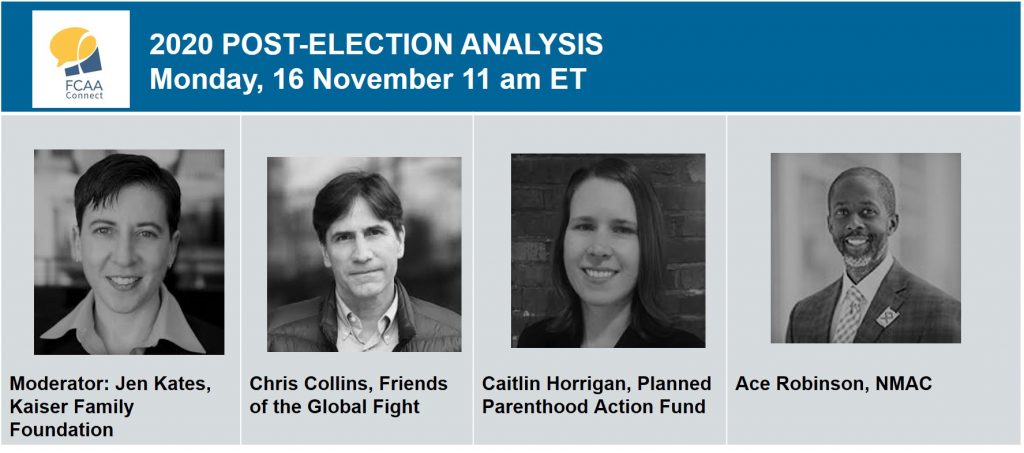Post-Election Analysis: What Should HIV-informed Funders Know?
On November 16th, just over a week after the Election results were confirmed, FCAA convened an expert panel to discuss the potential impact on HIV, global health and reproductive freedom, and health and rights.

While the panel dove into a number of complex and pressing challenges — COVID-19, the future of the Centers for Disease Control & Prevention (CDC), rescinding the Global Gag Rule, housing, the public’s belief in science, and Vice President-elect Harris’ record on actions against sex workers — there was one consistent thread that underpinned all of their remarks: advocacy.
- The Next Generation. As noted by Ace Robinson, Director of Strategic Partnerships & the Center to End Epidemics at NMAC, this election yielded a new number of LGBTQ+-identified members in the House and Senate, and with that, a critical opportunity to educate and uplift new voices. Robinson called for funders to prepare for the future by identifying and working with those who will become champions on health and LGBTQ issues.
- Think Big. Chris Collins, President of Friends of the Global Fight, shared that it is not an advocate’s job to be reasonable. Don’t ask for what you think might work; rather, talk about the great, profound human need and the degree to which we continually underinvest in health. It is time for that to end. There are people with real decision-making power that will be receptive to that message. We must help to create an enabling political environment around them so that they can act boldly. This is the time to think big.
- Act Now. Caitlin Horrigan, Director of Global Advocacy, Planned Parenthood Action Fund, reminded us that the early days of the Obama Administration were a ripe moment for change. The Biden-Harris Administration will be as well; it is a critical opportunity for the donor community to invest in and support the advocacy work that will need to happen in its early days.
The webinar served as a reminder that a new Administration does not eliminate all of the damage done in the past four years, nor the challenges the HIV/AIDS response faced before the Trump era:
- The damage of the Global Gag Rule (GGR) — while it will likely be rescinded in the early days of the Biden Administration — is far-reaching. Recovery will take time. Though expanded under Trump, the policy has been enacted by every Republican president since Ronald Reagan. As the White House passes back and forth between political parties, so too does the policy. Never, though, is there enough time to unwind the damage done while the policy is in effect. To end this cycle, attention should be given to legislative efforts to permanently end the GGR, such as the Global HER Act.
- We still have much to do to ensure that the response to ending the HIV epidemic in the U.S. is sustainable, equitable, and representative of the actual needs of the community of people living with HIV. How the Biden Administration works to do so remains to be seen, although early statements signal commitments to reinstating the Office of National AIDS Policy, and expanded funding for the Global Fund and PEPFAR. Regardless, our community must play a role in helping to inform those efforts, sharing the expertise we have gained over the past several decades.
- The COVID-19 pandemic has shown us that the ability to flourish economically is intimately connected with health. How can this understanding help us to move towards systemic change in domestic and global health? Again, HIV grant-makers have a great deal of intelligence and experience to offer on this topic. We must ensure that our voices — and, even more importantly those of the individuals and organizations we fund — are represented as these discussions take place.
The past four years — the harmful policies, a global pandemic — have had an outsized impact on our work. But this time has also reignited our fighting spirit. FCAA will be here to inform, connect, and support this community as HIV-informed funders, along with the Biden Administration, build back better.
For those who missed this discussion – or for those who simply want to revisit it – we encourage you to watch the recording and review the collected resources.